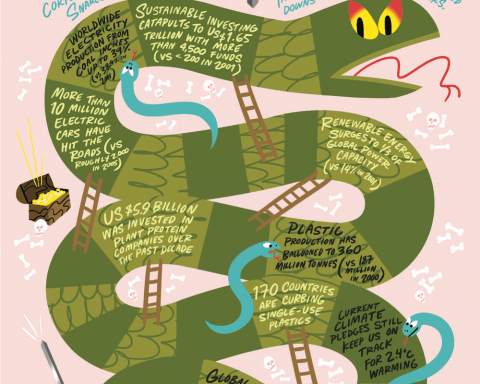There aren’t many planes in the sky right now, but those that are have two things in common: they’ve got both a detailed flight plan and guidance from people in control towers who have sightlines across multiple flight paths and a laser focus on getting everyone safely to their destinations.
In the same way, our banks, pension funds and insurance companies need detailed plans and system-level guidance with respect to their responses to the climate crisis. We need to ensure that sufficient capital is flowing toward vital climate solutions, enabling the pace and scope of the retooling required of our energy, industrial and built environments.
We also need to more intentionally manage the financial risks associated with industries and activities that impede progress toward a net-zero economy, risks that could at some point generate large-scale shocks to our financial system. All of us, from mutual fund owners to pension plan beneficiaries, have a stake in seeing this systemic instability minimized.
We’ll benefit further if, along the way, we can position Canada’s financial industry to play a leading role in the burgeoning field of sustainable finance – and to capture market opportunity that could be as high as $110 billion annually by 2025.
Happily, the federal Office of the Superintendent of Financial Institutions (OSFI) is mandated to keep tabs on the banks, insurers, trust companies, loan-makers and pension plans that make up our financial community. OSFI is already uniquely well-positioned in the control tower and now needs to put climate risk front and centre among its navigational priorities.
OSFI is thinking along the right lines. In January, it published a consultation paper called “Navigating Uncertainty in Climate Change.” Our organizations were among many to provide comments, and we now await what we hope will be an action-oriented response to inform institutional climate-risk flight plans.
OSFI needs to enable our financial institutions, which are among the best in the world, to optimize the allocation of resources toward projects that mitigate the risks of, and adapt to, the worst effects of climate change. Good guidance will allow financiers to better anticipate what is coming next, and to spur innovation. Poor guidance will put our financial institutions, and the environment, into a tailspin from which it will be difficult to recover.
In the spirit of aviation checklists, here are some suggested dos and don’ts for OSFI as it moves forward in defining the outcome of this vital consultative effort.
• Do act quickly. The sooner the financial market is more clearly mandated to respond to climate change by OSFI and the federal government, the more effective our collective response will be and the better the likelihood of us achieving our net-zero ambitions.
• Do build on existing frameworks, and in particular mandate implementation of the recommendations from the Task Force on Climate-Related Financial Disclosures (TCFD). The TCFD is widely endorsed, particularly by institutional investors hungry for consistent and actionable disclosures on climate-related exposures, and needs to be more widely adopted by Canadian market participants. Other countries are well ahead of us on this.
• Do take this opportunity to revisit old rules that stymie the effective allocation of capital toward climate-positive projects. One particular concern is prudential requirements that reflect an under-estimation of the liquidity of green infrastructure investments, and thus inhibit capital flows in this vital direction.
• Don’t let perfection be the enemy of good. OSFI’s guidance should clearly chart Canada’s destination (net-zero) and the expected time within which we need to get there, and then empower financial markets to assess risk and leverage value while fully factoring in climate-related considerations.
• Don’t fear making ongoing changes as the market evolves to help Canada achieve its climate ambitions. Financial markets are dynamic systems, and our financial institutions are exposed to, and active participants in, international markets that will change over time.
• Don’t forget climate opportunities. The focus of OSFI’s consultation was on climate risk. But opportunity coincides with risk, and financial markets are adept at creating and commercializing opportunities, if they have the right information and the freedom to do so.
In 2019, a British Airways plane took off from London destined for Dusseldorf, Germany, but ended up in Edinburgh, Scotland. The reason? A bad flight plan.
In that case, bad paperwork meant haggis instead of bratwurst. If OSFI gets its guidance wrong, the consequences will be far worse – for our savings, pensions and the environment.
Pete Richardson is a climate strategist at Manifest Climate. Manifest Climate and Corporate Knights’ CEO Toby Heaps issued a joint submission with their comments to the OSFI Working Group. The full submission can be found below:
OSFI Consultation Submission OSFI Consultation Submission







